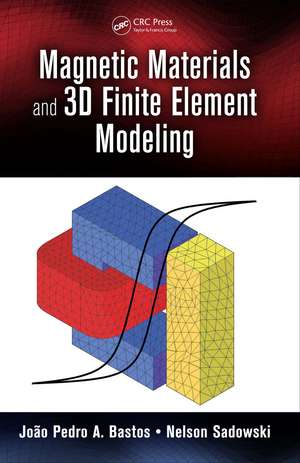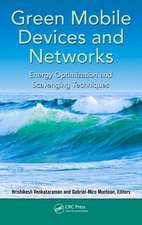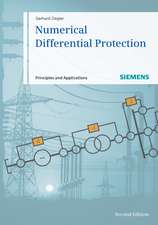Magnetic Materials and 3D Finite Element Modeling
Autor João Pedro A. Bastos, Nelson Sadowskien Limba Engleză Hardback – 16 oct 2013
The authors present current concepts on ferromagnetic material characterizations and losses. They provide introductory material; highlight basic electromagnetics, present experimental and numerical modeling related to losses and focus on FEM applied to 3D applications. They also explain various formulations, and discuss numerical codes.
• Furnishes algorithms in computational language
• Summarizes concepts related to the FE method
• Uses classical algebra to present the method, making it easily accessible to engineers
Written in an easy-to-understand tutorial format, the text begins with a short presentation of Maxwell’s equations, discusses the generation mechanism of iron losses, and introduces their static and dynamic components. It then demonstrates simplified models for the hysteresis phenomena under alternating magnetic fields. The book also focuses on the Preisach and Jiles–Atherton models, discusses vector hysterisis modeling, introduces the FE technique, and presents nodal and edge elements applied to 3D FE formulation connected to the hysteretic phenomena.
The book discusses the concept of source-field for magnetostatic cases, magnetodynamic fields, eddy currents, and anisotropy. It also explores the need for more sophisticated coding, and presents techniques for solving linear systems generated by the FE cases while considering advantages and drawbacks.
Preț: 1334.90 lei
Preț vechi: 1627.92 lei
-18% Nou
Puncte Express: 2002
Preț estimativ în valută:
255.43€ • 267.41$ • 211.35£
255.43€ • 267.41$ • 211.35£
Carte tipărită la comandă
Livrare economică 07-21 aprilie
Preluare comenzi: 021 569.72.76
Specificații
ISBN-13: 9781466592513
ISBN-10: 1466592516
Pagini: 400
Ilustrații: 263 b/w images and 30 tables
Dimensiuni: 156 x 234 x 25 mm
Greutate: 0.68 kg
Ediția:New.
Editura: CRC Press
Colecția CRC Press
ISBN-10: 1466592516
Pagini: 400
Ilustrații: 263 b/w images and 30 tables
Dimensiuni: 156 x 234 x 25 mm
Greutate: 0.68 kg
Ediția:New.
Editura: CRC Press
Colecția CRC Press
Cuprins
Statics and Quasistatics Electromagnetics: Brief Presentation. Ferromagnetic Materials and Iron Losses. Scalar Hysteresis Modeling. Vector Hysteresis Modeling. Finite Element Method: Brief Presentation. Using Nodal Elements with Magnetic Vector Potential. Source-Field Method for D Magnetostatic Fields. Source-Field Method for D Magnetodynamic Fields. Matrix-Free Iterative Solution Procedure for Finite Element Problems. References. Index.
Recenzii
"… an important contribution to the area of numerical design in electromagnetics and in particular in low frequency design, including electric machines and actuators. It is a thorough, balanced presentation of the theory and its application."
—Dr. Nathan Ida, The University of Akron
"Written by specialists in the modeling of electromagnetism …useful for researchers and teachers with experience in the area or for students, wishing to acquire knowledge in the field."
—F. Bouillaultm, Professor at Paris Sud University
"Anyone who wants to learn how to model magnetic cores, especially transformer core materials, in 3D will find this book extremely useful."
—IEEE Electrical Insulation Magazine, January/February 2015
—Dr. Nathan Ida, The University of Akron
"Written by specialists in the modeling of electromagnetism …useful for researchers and teachers with experience in the area or for students, wishing to acquire knowledge in the field."
—F. Bouillaultm, Professor at Paris Sud University
"Anyone who wants to learn how to model magnetic cores, especially transformer core materials, in 3D will find this book extremely useful."
—IEEE Electrical Insulation Magazine, January/February 2015
Notă biografică
João Pedro A. Bastos completed his doctoral thesis (Docteur d’Etat) at Université Pierre et Marie Curie, Paris VI, in 1984. He then returned to Brazil at the Universidade Federal de Santa Catarina (UFSC) and became a full professor in 1992. He founded GRUCAD in 1985—a group that plays an important role in the development of the area of electromagnetic field analysis in Brazil. Dr. Bastos worked as a visiting professor at the University of Akron, Ohio, in 1992 and 2001. He is also the author of four books and has published several papers in periodic journals and conferences.
Nelson Sadowski received his engineering and master of science degrees from Universidade Federal de Santa Catarina (UFSC) in 1982 and 1985, respectively. In 1993, he received his PhD from the Institut National Polytechnique de Toulouse (INPT). He then returned to Brazil and continued his research and teaching activities at GRUCAD-UFSC and became a full professor in 1996. In 2000, he received his HDR (Habilitation) diploma, also from the INPT. Dr. Sadowski has been active on international agreements with universities in France, Germany, and Belgium. He is also the author of several conference and journal papers. He is also very active on industrial consulting.
Nelson Sadowski received his engineering and master of science degrees from Universidade Federal de Santa Catarina (UFSC) in 1982 and 1985, respectively. In 1993, he received his PhD from the Institut National Polytechnique de Toulouse (INPT). He then returned to Brazil and continued his research and teaching activities at GRUCAD-UFSC and became a full professor in 1996. In 2000, he received his HDR (Habilitation) diploma, also from the INPT. Dr. Sadowski has been active on international agreements with universities in France, Germany, and Belgium. He is also the author of several conference and journal papers. He is also very active on industrial consulting.
Descriere
This book provides the necessary information on material characterization and finite element methods applications. It begins with a thorough introduction to materials and basic electromagnetics, and provides a refresher on the finite elements method concepts. The book then moves into experimental and numerical modeling related to losses and material characterization with an emphasis on hysteresis. The second part of the book employs the concepts presented in its first part and apply them on 3D Finite Element methods in several formulations, considering nodal and edge elements.








